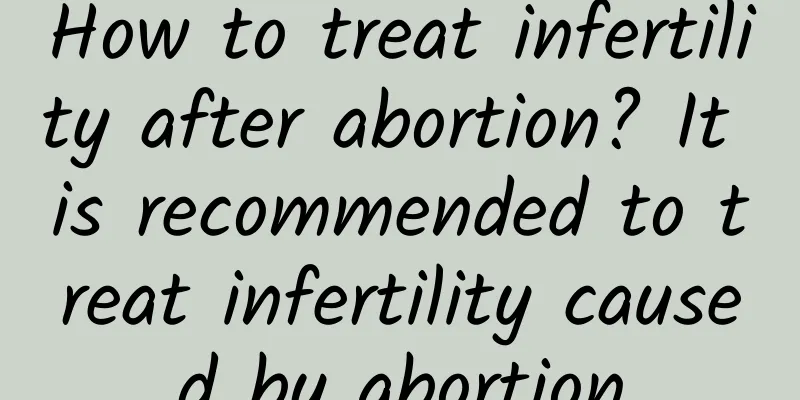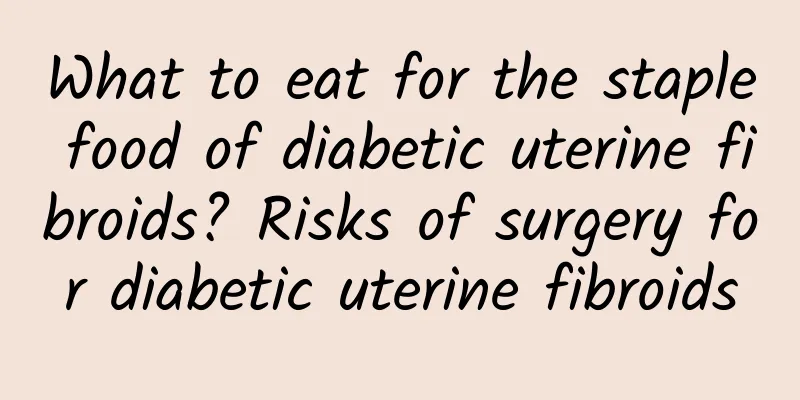When will menstruation come after abortion? What if menstruation does not come after abortion?

|
When will menstruation come after abortion? This is a question that many women are concerned about after abortion. Menstruation is part of a woman's normal physiological cycle, and abortion will have a certain impact on the menstrual cycle. However, everyone's situation is not exactly the same, so it is impossible to give an accurate answer. The following are some common situations and possible causes for your reference. 1. Generally speaking, the first menstruation after abortion will resume between 46 weeks after surgery, but some women may delay it to 8 weeks. This is because abortion will put a certain amount of pressure and impact on the female body, and the body needs some time to adapt and recover. 2. If you have not had your period one month after surgery, it may be due to complications or other problems after surgery. You should consult a doctor for a detailed examination and evaluation. Possible causes include postoperative infection, endometrial residue or hormonal imbalance. 3. Hormone imbalance is one of the common reasons for delayed menstruation after abortion. Abortion will stimulate the endometrium to a certain extent, leading to changes in hormone secretion and regulation. In this case, menstruation may be delayed for some time compared to the normal cycle. Usually, this hormonal imbalance will recover on its own within a few months after surgery, and the menstrual cycle will gradually return to normal. 4. Some women may experience long-term menstrual irregularities after abortion, such as long delays, intermittent bleeding, etc. This may be due to the lasting effects of the surgery on physiological functions, or it may be due to some trauma to the endometrium during the abortion process. In this case, you need to consult a doctor and undergo further tests and examinations. In general, the time and situation of menstrual recovery after abortion will vary depending on individual constitution, surgical method and recovery situation. Most women can resume normal menstrual cycles within a few months after surgery, but some women may need longer to adjust and recover. If there are any abnormalities or discomfort during the recovery of menstruation, it is recommended to consult a doctor in time for professional guidance and treatment. |
<<: What causes uterine fibroids? Top 10 foods to avoid when you have uterine fibroids
>>: What should you not eat after an abortion? What should you eat after an abortion?
Recommend
What to do with chronic pelvic inflammatory disease and low back pain
What to do if you have chronic pelvic inflammator...
Can I get pregnant after having amenorrhea?
Amenorrhea after childbirth is usually caused by ...
Common nursing methods for patients with cervical warts
People should pay attention to the occurrence of ...
Traditional Chinese Medicine Treatment Methods for Pelvic Peritonitis
The treatment of pelvic peritonitis should be bas...
What are the main clinical symptoms of bacterial vaginosis?
Women with bacterial vaginosis can see a lot of u...
How serious is the danger of pelvic inflammatory disease?
1. Cause ectopic pregnancy Due to pelvic congesti...
What medicine to use for breast nodules and uterine fibroids What should not be eaten for breast nodules and uterine fibroids
What medicine to use for breast nodules and uteri...
【Video version】Lose weight following your menstrual cycle! Eat beef and kelp to get a lean body
A girl's menstrual cycle is divided into four...
Why do ovarian cysts occur?
Why do people get ovarian cysts? Many women with ...
Can uterine evacuation treat cervical erosion?
Cervical erosion generally refers to cervical col...
Subendometrial fibroids symptoms
Subendometrial fibroids symptoms: Uterine fibroid...
Some precautions after abortion in winter
Abortion is a common surgery, and many women do i...
Can cervical warts be completely cured?
In life, many patients will have a great impact o...
What are the specific dangers of uterine fibroids?
What are the specific hazards of uterine fibroids...
What causes abnormal dysmenorrhea?
Dysmenorrhea refers to pain in the lower abdomen ...









